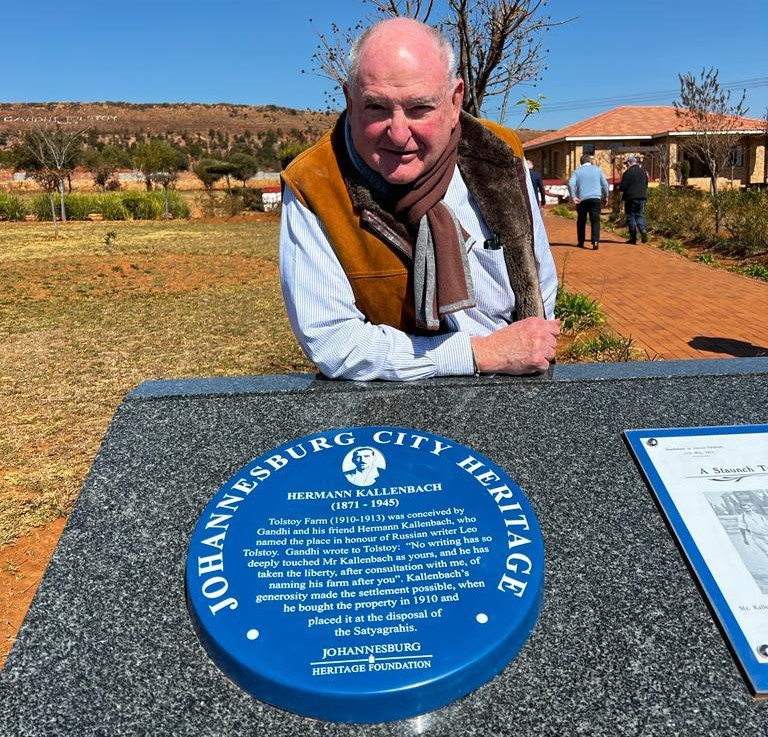click to dowload our latest edition
CLICK HERE TO SUBSCRIBE TO OUR NEWSLETTER


Published
9 months agoon
Three famous names: Hermann Kallenbach, Mahatma Gandhi, and Count Leo Tolstoy all came together at a blue plaque ceremony at Tolstoy Farm near Lenasia on Sunday 6 August.
The ceremony honoured Kallenbach, a pioneering early Johannesburg Jewish architect and developer, for making Tolstoy Farm a possibility by buying the 1 000-acre property in 1910 and donating it to the Satyagraha Movement.
Gandhi set up an ashram there, and ran it from 1910 to 1913, based on ideas of non-violence and a simple, ascetic lifestyle. Tolstoy Farm became one of the cornerstones of the South African passive resistance civil-rights campaign against the Transvaal’s discriminatory laws against Indians.
Today, the farm and surrounding area is owned by Corobrik, which, thanks to chief executive Nicholas Booth, has built a commemorative garden and museum near the foundation of the original farmhouse. There’s a bust of Gandhi on the one side of the steps of the old farmhouse, and on the other side, there’s a bust of Nelson Mandela, but until now, there was no memorial to the man who gave substance and reality to Gandhi’s dream, Hermann Kallenbach.
Kallenbach is famous for his close friendship with Gandhi during Gandhi’s sojourn in South Africa from 1903 to 1914. During this decade, the two men shared ideals and a life of physical labour, exercise, vegetarianism, and self-sufficiency. In fact, Kallenbach played an integral role in shaping Gandhi’s philosophy of non-violence, says Kathy Munro, vice-chairperson of the Johannesburg Heritage Foundation (JHF) and chairperson of the blue plaque committee. Kallenbach was also a committed Zionist, and a property tycoon credited with developing Sylvia Pass and Linksfield Ridge in Johannesburg.
The JHF unveiled two blue plaques at the site – honouring Kallenbach and Tolstoy. The latter’s writings and philosophy, particularly his book, The Kingdom of God is Within You, deeply influenced Gandhi and Kallenbach, who were by then “soulmates”, according to Gandhi.
“No writing has so deeply touched Mr Kallenbach as yours, and he has taken the liberty, after consultation with me, of naming his farm after you,” Gandhi wrote to Tolstoy in an exchange of letters between him and Tolstoy from 1909 to 1910.
“[Gandhi and Kallenbach] shared core ideas of non-violence, identified with the poor and down-trodden, and committed to transforming their lives accordingly,” the plaque honouring Tolstoy reads. “Gandhi’s ideals of civil disobedience guided by the voice of conscience, together with a life of material simplicity, as practised at Tolstoy Farm, were akin to those taught by Tolstoy.”
“Tolstoy Farm was part of a chain of progressive, broadly socialist ideas and ideals that extended from the Russian estate of Tolstoy at the Yasnaya Polyana, to the first Gandhi ashram in Ahmedabad, India, to Kibbutz Degania in Israel [where Kallenbach’s ashes are interred],” said the JHF.
“On this farm, Kallenbach abandoned the life of a wealthy, sport-loving bachelor, adopting the simple lifestyle, vegetarian diet, and equality politics of Gandhi,” said his great-nephew, Michael Kallenbach, at the unveiling of the plaque in honour of his “late, great uncle HK”.
The plaques include a third, photographic plaque titled “A Staunch Tolstoyan” which shows Kallenbach walking the almost 35km from Tolstoy Farm to Johannesburg, which he apparently did often.
“Tolstoy Farm is located close to Lawley Station, so the choice of travel to Johannesburg at that early date was by train or, as Gandhi and Kallenbach preferred, to walk. It was quite a hike, about five hours over rough veld and early gravel roads, but Kallenbach and Gandhi were fit men – at that stage just touching 40 to 42 years old – so they strode out in emulation of Tolstoy and the goals of an ascetic lifestyle,” the JHF writes.
Eric Itzkin, the deputy director immovable heritage at the City of Johannesburg (COJ), describes Tolstoy Farm as “an extraordinary model for an alternative society – a multi-cultural, multi-faith, and multi-linguistic community bound by a shared belief in social justice”.
The farm has recently been nominated for national heritage site status by the COJ Directorate of Arts Culture and Heritage, with support from the Mahatma Gandhi Remembrance Organisation.
As well as the above organisations, Munro mentioned the assistance of the Indian government, saying that it had preserved historical sites, purchased the Kallenbach papers from Israel, and saved artifacts related to Gandhi’s life crucial in allowing future generations to connect with his legacy. She also thanked the Gandhi and Kallenbach families for their ongoing support.
“We’re remembering three remarkable individuals who, through their unwavering commitment to truth, justice, and compassion, have inspired generations. Their legacies continue to inspire and shape the world,” she said.
